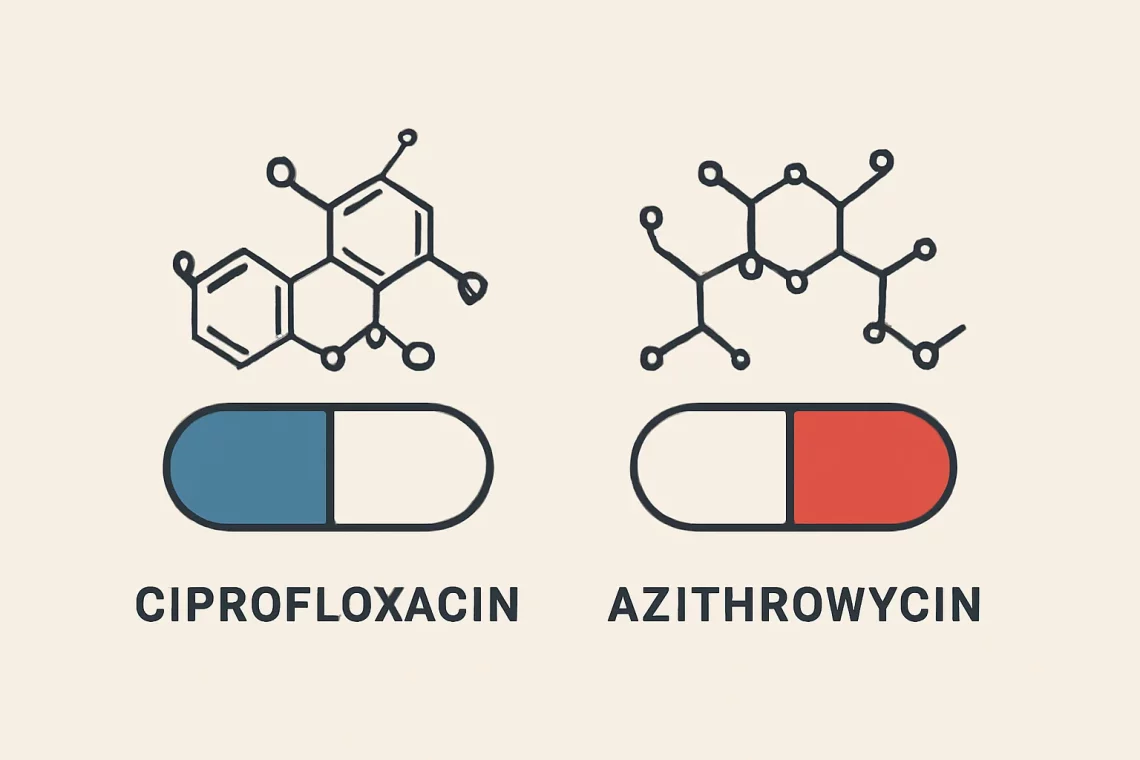-
Ciprofloxacin vs Azithromycin: Comparing Antibiotics for Infections
Ciprofloxacin and Azithromycin are two widely used antibiotics that belong to different classes of antimicrobial agents. Each drug has its unique mechanism of action, spectrum of activity, and clinical applications. Understanding the differences and similarities between these two medications is crucial for both healthcare professionals and patients alike. Ciprofloxacin, a fluoroquinolone antibiotic, is known for its broad-spectrum efficacy against a variety of bacterial infections. It works by inhibiting bacterial DNA gyrase and topoisomerase IV, enzymes that are essential for bacterial DNA replication, transcription, and repair. This action leads to the death of susceptible bacteria. Ciprofloxacin is often prescribed for respiratory, urinary tract, and skin infections, as well as specific gastrointestinal…
-
Ciprofloxacin vs Doxycycline: Which Antibiotic is Right for You?
Ciprofloxacin and doxycycline are two widely used antibiotics that belong to different classes of medications, each with its unique mechanisms of action and therapeutic applications. Understanding the distinctions between these two drugs can be crucial for both healthcare professionals and patients when deciding on the most appropriate treatment for bacterial infections. Ciprofloxacin is a fluoroquinolone antibiotic that works by inhibiting bacterial DNA gyrase and topoisomerase IV, enzymes essential for bacterial replication and survival. It is effective against a broad range of gram-negative and some gram-positive bacteria, making it a versatile choice for treating various infections, including urinary tract infections, respiratory infections, and certain gastrointestinal infections. On the other hand, doxycycline…
-
Ciprofloxacin vs Levofloxacin: Which Antibiotic is Right for You?
Ciprofloxacin and Levofloxacin are two widely used antibiotics that belong to the fluoroquinolone class of drugs. These medications are commonly prescribed to treat various bacterial infections, making them vital tools in modern medicine. Their effectiveness against a broad range of pathogens has made them popular choices among healthcare providers. However, despite their similarities, there are distinct differences between these two medications that can influence treatment decisions. The rise of antibiotic resistance has further complicated the landscape of bacterial infections, necessitating a deeper understanding of the available treatment options. Healthcare professionals often assess the specific characteristics of each antibiotic, including their spectrum of activity, pharmacokinetics, and potential side effects, to determine…
-
Ciprofloxacin vs Augmentin: Comparing Antibiotic Effectiveness and Uses
Ciprofloxacin and Augmentin are two widely prescribed antibiotics, each playing a significant role in the treatment of various bacterial infections. While they are both effective in combating infections, they belong to different classes of antibiotics and have distinct mechanisms of action, spectrum of activity, and potential side effects. Understanding the differences between these medications can help patients make informed decisions about their treatment options. Ciprofloxacin is a fluoroquinolone antibiotic that works by inhibiting bacterial DNA gyrase, an enzyme crucial for bacterial replication. This makes it particularly effective against a variety of gram-negative bacteria, as well as some gram-positive organisms. On the other hand, Augmentin is a combination antibiotic that includes…
-
Doxycycline vs Cipro: Key Differences and Uses Explained
Doxycycline and Ciprofloxacin are both antibiotics that play significant roles in modern medicine. They are effective in treating a variety of bacterial infections, but they belong to different classes of antibiotics and have distinct mechanisms of action. Understanding the differences between these two medications can help both healthcare providers and patients make informed choices regarding treatment options. Doxycycline, a tetracycline antibiotic, is often used to treat infections such as acne, respiratory tract infections, and certain sexually transmitted infections. It works by inhibiting bacterial protein synthesis, thereby preventing the growth and reproduction of bacteria. On the other hand, Ciprofloxacin, a fluoroquinolone antibiotic, is commonly prescribed for urinary tract infections, gastrointestinal infections,…
-
Ciprofloxacin vs Cipro: Understanding the Differences and Uses
Ciprofloxacin and Cipro are terms that often create confusion among patients and healthcare providers alike. Understanding the nuances between these two can significantly impact treatment outcomes. Ciprofloxacin is a broad-spectrum antibiotic belonging to the fluoroquinolone class, widely utilized for treating various bacterial infections. It works by inhibiting bacterial DNA gyrase, a vital enzyme necessary for DNA replication and repair, thereby effectively stopping bacterial growth. Cipro, on the other hand, is simply a brand name for ciprofloxacin. While the two terms are often used interchangeably, it’s essential to recognize that Cipro represents a specific formulation of the active ingredient ciprofloxacin. Brand names like Cipro may also include other inactive components that…
-
Ciprofloxacin vs Bactrim: Choosing the Right Antibiotic for You
Ciprofloxacin and Bactrim are two widely used antibiotics that play a crucial role in the treatment of various bacterial infections. As antibiotic resistance becomes a growing concern, understanding the mechanisms, effectiveness, and potential side effects of these medications is essential for informed healthcare decisions. Each antibiotic has its own unique profile, making it suitable for different types of infections and patient conditions. Ciprofloxacin, a fluoroquinolone antibiotic, works by inhibiting bacterial DNA gyrase, which is vital for bacterial replication. On the other hand, Bactrim, a combination of sulfamethoxazole and trimethoprim, disrupts the bacterial folic acid synthesis, thereby hindering bacterial growth. The choice between these two antibiotics often depends on the specific…
-
Ciprofloxacin vs Levaquin: Understanding Their Differences and Uses
Ciprofloxacin and Levaquin are two widely used antibiotics, both belonging to the fluoroquinolone class of medications. These drugs are often prescribed to treat bacterial infections, ranging from urinary tract infections to respiratory conditions. Despite their similarities, each medication has its own unique characteristics, indications, and potential side effects. Understanding the differences and applications of Ciprofloxacin and Levaquin can help patients and healthcare providers make informed decisions about treatment options. While both medications target bacterial infections, they may vary in effectiveness depending on the type of bacteria involved and the severity of the infection. Furthermore, the choice between these antibiotics may also depend on the patient’s medical history, potential drug interactions,…
-
Azithromycin vs Cipro: Understanding Their Differences and Uses
The world of antibiotics is vast and complex, with many options available to treat various bacterial infections. Two commonly prescribed antibiotics, Azithromycin and Ciprofloxacin, represent distinct classes of medications that serve specific purposes in fighting infections. Both drugs have unique mechanisms of action, side effects, and spectrum of activity, making them suitable for different types of bacterial pathogens. Azithromycin, a macrolide antibiotic, is often favored for its ability to treat respiratory infections, skin infections, and some sexually transmitted diseases. Its convenient dosing schedule and relatively mild side effect profile make it a popular choice among healthcare providers. On the other hand, Ciprofloxacin, a fluoroquinolone, is known for its broad-spectrum activity…
-
Understanding Fish Cipro: Uses, Benefits, and Safety Precautions
Fish Cipro, also known as ciprofloxacin, is a broad-spectrum antibiotic that has been widely used for various infections in both humans and animals. Its effectiveness against a range of bacterial pathogens makes it a staple in the treatment of numerous health concerns. In recent years, however, it has also gained attention in the realm of aquaculture, where it is used to combat bacterial infections in fish. The increasing popularity of fish keeping and aquaculture has led to a greater need for understanding the appropriate use of medications like Fish Cipro. Ciprofloxacin functions by inhibiting bacterial DNA gyrase, an essential enzyme for bacterial replication. This action makes it particularly potent against…






































